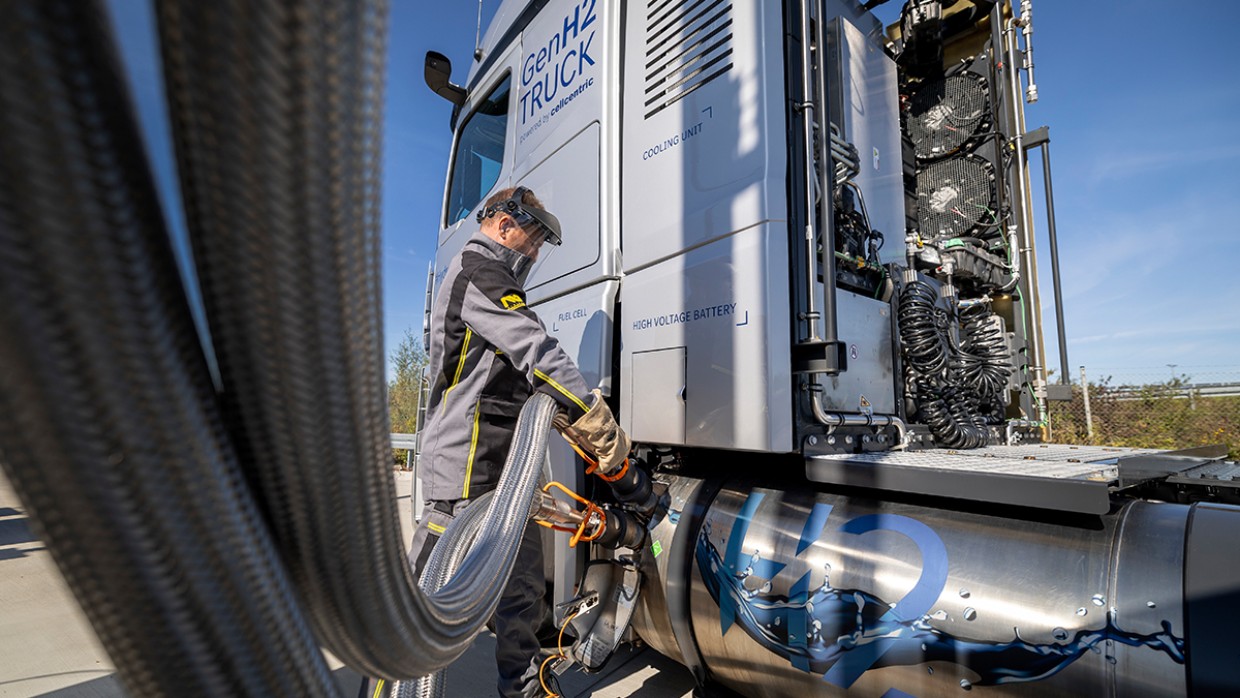News
News
Where Do We Currently Stand With Hydrogen Mobility?
For logistics professionals, hydrogen represents an alternative CO2-free energy source with many advantages for the transportation industry such as relatively short refuelling times, long ranges, and tanks that weigh less than the batteries in comparable electric lorries. In other words, hydrogen could certainly offer advantages when covering long distances and especially when transporting heavy loads.
Volvo Trucks has just announced the launch of hydrogen-powered trucks. Corresponding road tests are scheduled to begin in 2026. The launch is planned for the end of this decade.
As early as September 2023, Daimler Truck reported that a prototype of the Mercedes-Benz GenH2 Truck has been approved for use on public roads and covered a distance of 1,047 kilometres on a single tank of liquid hydrogen as part of Daimler Truck's #HydrogenRecordRun. Back in 2020, Daimler Truck announced its intention to invest heavily in hydrogen technology and that it is focusing on renewable liquid hydrogen. According to the company, the test drive of the Mercedes-Benz GenH2 Truck involved filling two 40 kg tanks mounted on each side of the chassis with liquid hydrogen that had been cooled to minus 253 degrees Celsius. Vehicle tests with customers are planned from the middle of this year.
Despite this optimistic news, Germany's hydrogen plans and the development of hydrogen mobility have stalled. The only two car models currently available in Germany are the Toyota Mirai and Hyundai Nexo. According to the statistics, the number of new car registrations is correspondingly low with just 39 between January and April.
In the road freight transport sector, the situation does not seem any better. Fewer than 100 fuel-cell-powered lorries were on the road in Germany at the beginning of the year. The main reason is probably the price. After all, a hydrogen-powered lorry would cost a logistics company three to four times more than a conventional diesel truck. In addition, the operating costs are currently about twice as high as the charging costs for an equivalent battery-powered vehicle.
Progress is similarly slow when it comes to fuelling stations. Germany currently has 90 public hydrogen fuelling stations for cars and 20 stations for heavy commercial vehicles. Some pumps have already been removed because they are unprofitable.
According to experts, municipalities that want to switch to hydrogen buses are now experiencing problems in building the filling stations they need. The reason is a lack of funding.
Overall, the issue of hydrogen mobility seems to be losing political support, even though the German government has confirmed that it is meeting its obligations under the EU's Alternative Fuels Infrastructure Regulation (AFIR). The AFIR stipulates that hydrogen filling stations are to be built every 200 kilometres along the trans-European transport network (TEN-T) and at all major urban interchanges beginning in 2030. This cannot be achieved without massive state subsidies which are becoming increasingly scarce.
At the same time, Division 25 (Hydrogen and Fuel Cells in Mobility) within the Federal Ministry of Transport (BMDV) will be effectively closed down and its duties redistributed among other divisions. Due to irregularities in how funding decisions had been made, the BMDV stopped awarding funding for H2 projects in February 2024. In addition, the majority of the members of the Council of Experts, which advises the Federal Government, voted in favour of electrifying heavy freight transport.
Expansion of Germany's planned core hydrogen network is likewise behind schedule. As reported by Deutschlandfunk in early April, the ten-thousand-kilometre network will be completed by 2037 at the latest. It was originally planned for 2032 by the Federal Minister for Economic Affairs and Climate Action Robert Habeck.
There is also still the question of how to secure future hydrogen demand here in Germany.
In other words, there are still a number of hurdles to overcome before hydrogen can play a significant role as an energy source for transportation.



